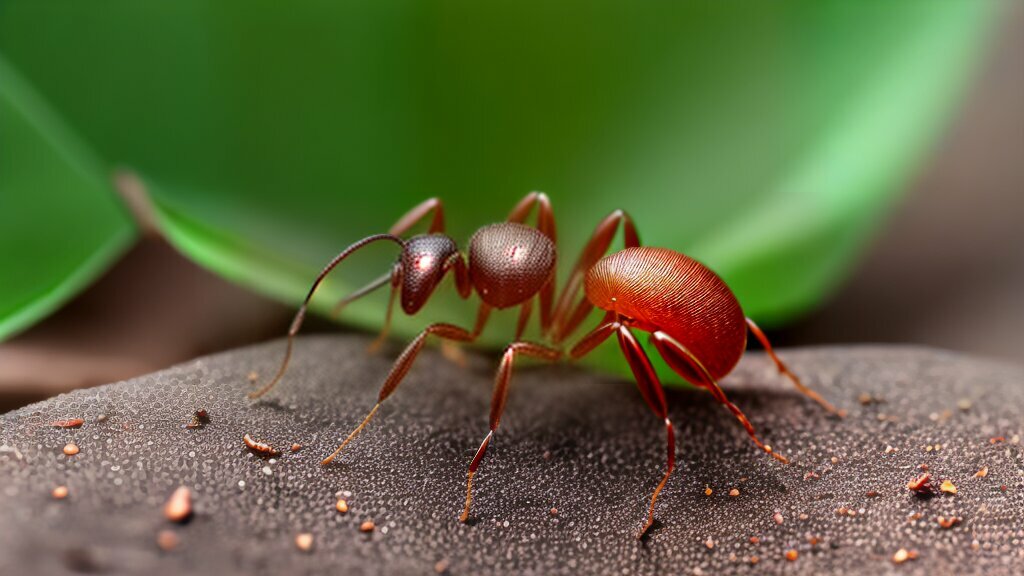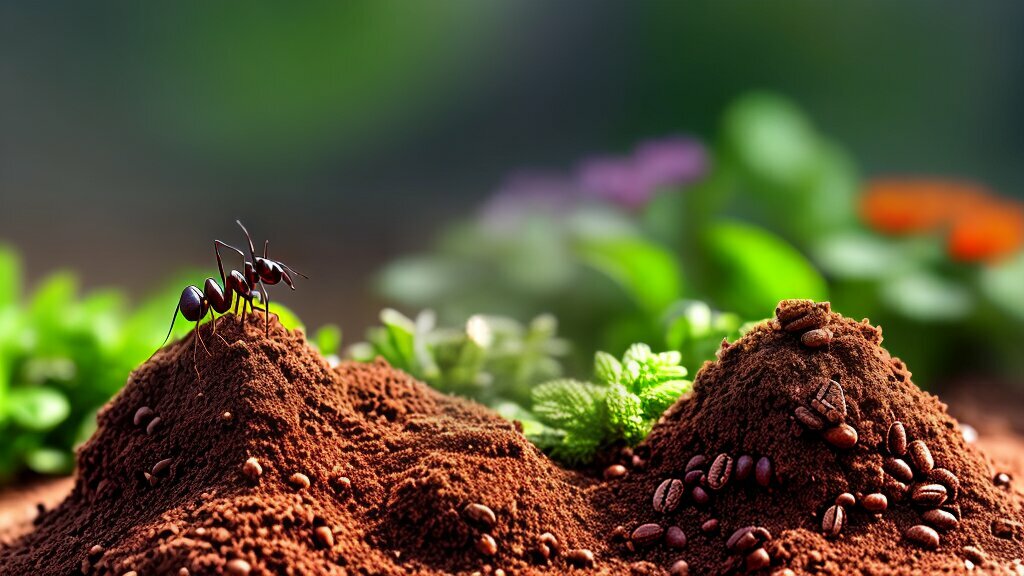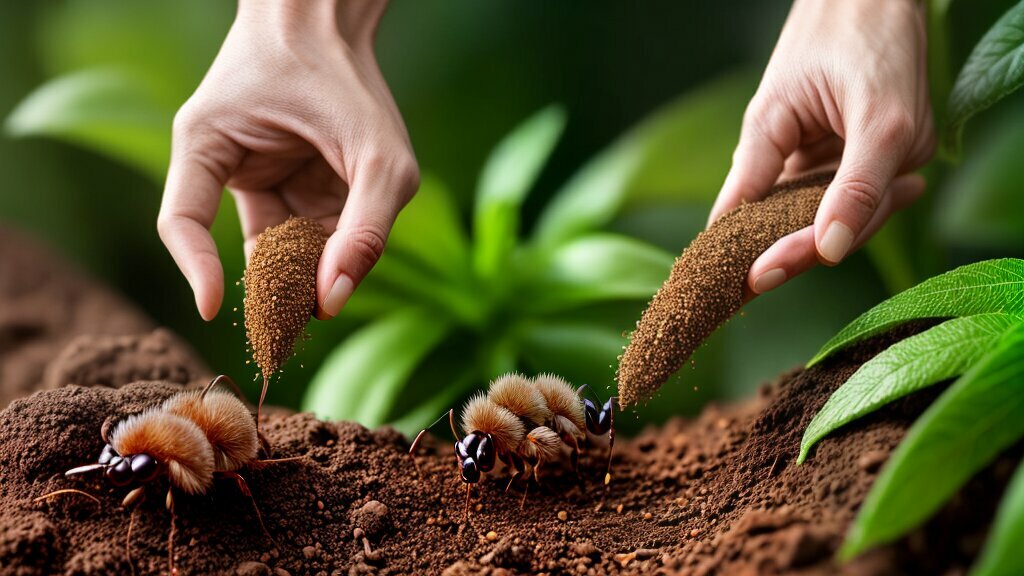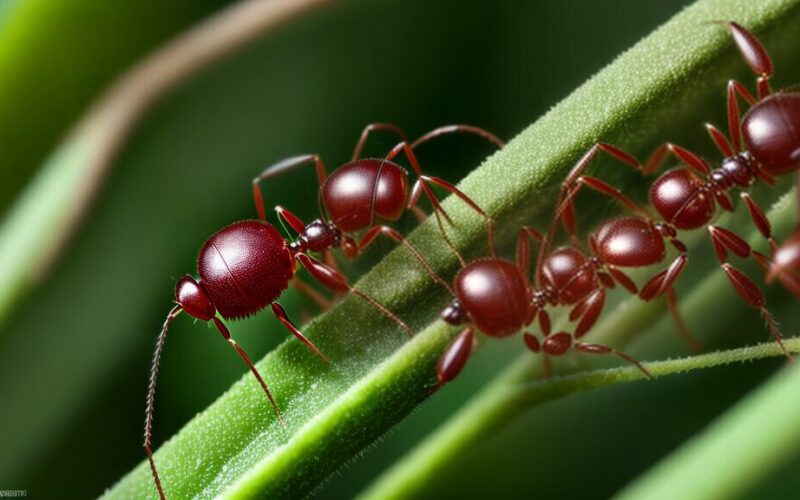Dealing with ants can be a pesky problem in your garden, but you don’t have to resort to harmful methods that can damage your plants. There are safe and effective solutions for killing ants without harming your garden.
In this section, we’ll explore natural ant repellents and organic ant control methods that will help you maintain a healthy garden. You’ll learn why it’s important to choose non-toxic alternatives and various techniques to physically deter ants from your plants.
Key Takeaways:
- There are safe and effective ways to kill ants without harming your plants.
- Using non-toxic alternatives and organic control methods can help you maintain a healthy garden.
- Ant exclusion techniques can physically deter ants from reaching your plants.
Understanding the Importance of Plant-Friendly Ant Control
If you’re struggling with ants invading your garden, it may be tempting to opt for toxic ant removal methods. However, it’s important to understand the negative impact these methods can have on your plants.
Toxic chemicals can harm not only ants but also the beneficial insects and microorganisms in your soil. Overuse of pesticides can also lead to pest resistance and damage to the ecosystem.
That’s why it’s crucial to choose non-toxic ant pest management techniques for your garden. Not only will these methods protect your plants, but they will also ensure the long-term health of your garden.
When choosing plant-friendly ant control measures, it’s essential to consider the specific needs of your garden. Non-toxic ant removal methods should be effective and tailored to your garden’s unique environment.
| Tip: | Avoid using chemical pesticides as they can harm both ants and beneficial insects in your soil. |
|---|
Instead, focus on organic ant control methods and natural ant repellents that are safe to use around plants. These plant-friendly ant control measures will help you keep ants away while maintaining the health and vitality of your garden.
Continue reading to discover effective natural ant repellents and organic ant control methods tailored to your garden’s unique needs.
Understanding the Importance of Plant-Friendly Ant Control
Natural Ant Repellents for Plant Protection
If you’re looking for safe and natural ways to repel ants from your plants, there are several ingredients and methods you can use. These plant-friendly ant control measures will help you keep ants away from your flower beds and other garden areas.
Cinnamon
Cinnamon is a natural ant repellent that is safe to use around plants. Simply sprinkle cinnamon powder around the base of your plants or along ant trails to deter them. You can also make a cinnamon spray by boiling cinnamon sticks in water and spraying the solution on your plants and garden areas.
Vinegar
Another effective natural ant repellent is vinegar. Mix equal parts of white vinegar and water in a spray bottle and apply the solution on garden areas where ants have been spotted. You can also use undiluted vinegar to wipe down surfaces or soak cotton balls in vinegar and place them near ant trails.
Citrus Peels
Ants dislike the smell of citrus, making it an effective natural ant repellent. Cut up citrus peels, such as from oranges or lemons, and spread them around the base of your plants or along ant trails. You can also make a citrus spray by boiling citrus peels in water and spraying the solution on your plants and garden areas.
Mint
Mint is another natural ant repellent that can be used to protect your plants. Crush fresh mint leaves and spread them around the base of your plants or along ant trails. You can also make a mint spray by boiling mint leaves in water and spraying the solution on your plants and garden areas.

Remember to reapply these natural ant repellents regularly, especially after rainfall or watering. By using these plant-friendly ant control methods, you can effectively keep ants away from your plants and maintain a healthy garden.
Organic Ant Control Methods for Your Garden
If you’re looking for an effective and safe way to control ants in your garden, organic methods are the way to go. These methods are non-toxic and environmentally friendly, making them a perfect choice for plant lovers. Here are some of the best organic ant control methods to keep your garden thriving:
| Method | Description |
|---|---|
| Natural baits | Organic baits made from natural ingredients like sugar and borax can be highly effective in attracting and eliminating ants. Place small amounts of bait near ant trails or nest entrances and wait for them to take the bait back to the colony, killing off the entire ant population. |
| Diatomaceous earth | This powdery substance is made from crushed fossilized algae and is a natural insecticide. It can be sprinkled around the perimeter of your garden or directly on ant trails to dehydrate and kill the ants. |
| Plant-based repellents | Essential oils like peppermint, cinnamon, and clove can be used to create a natural ant repellent spray. Mix a few drops of oil with water and spray it around your garden to deter ants from entering. |
Incorporating these organic ant control methods into your regular garden maintenance routine can help you eliminate ants without harming your plants. Remember, it’s important to use non-toxic methods to ensure a healthy and thriving garden.

Ant Exclusion Methods for Protecting Your Plants
If you want to prevent ants from reaching your plants altogether, ant exclusion methods are the way to go. By physically deterring ants from entering your garden areas, you can avoid potential ant damage to your plants. Here are some effective ant exclusion techniques:
- Barrier methods: Create a physical barrier around your plants using materials like plastic, duct tape, or petroleum jelly. You can also use natural barriers like cinnamon, coffee grounds, or citrus peels.
- Mulching: Apply a thick layer of mulch around your plants to prevent ants from accessing them. This will also help retain moisture in the soil and regulate soil temperatures.
- Hostile environments: Make your garden areas less attractive to ants by removing potential food sources. Clear away any fallen fruit, clean up spills, and store food in airtight containers.
Remember, ant exclusion methods should be used in conjunction with other plant-friendly ant control measures to ensure the health of your plants.

Integrating Ant Control with Plant Maintenance
Effective ant control is not just about eliminating ants; it’s also about taking care of your plants. By integrating ant control with proper plant maintenance, you can create an environment that is uninviting to ants. Here are some plant-friendly ant control measures to implement:
- Watering: Water your plants deeply and infrequently to prevent moisture-loving ants from setting up colonies near your plants.
- Pruning: Trim your plants regularly to keep them healthy and remove any dead or decaying foliage that can attract ants.
- Cleanliness: Keep your garden clean and free of clutter to remove any potential ant habitats.
Integrating ant control with proper plant maintenance can also help you identify ant problems early on. Regular monitoring of your garden can help you spot ant activity and take action before it becomes a major issue.
Remember to prioritize plant-friendly ant control measures to ensure the health and vitality of your garden. By combining ant control practices with proper plant care, you can create a beautiful and harmonious environment for both your plants and ants.

Additional Tips for Plant-Friendly Ant Control
Aside from the natural ant repellents and organic ant control methods we’ve discussed, there are additional steps you can take to ensure plant-friendly ant control in your garden.
- Remove ant food sources: Ants are attracted to sweet and sticky substances, so make sure to clean up any spills or debris that might attract them.
- Regular monitoring: Keep an eye out for ant activity and address any issues before they become severe.
- Create ant-deterring landscapes: Some plants, such as mint, marigolds, and lavender, have natural ant-repelling properties. Consider incorporating them into your garden design to naturally deter ants.
By implementing these additional tips and tricks, you can take your plant-friendly ant control measures to the next level and keep your garden healthy and thriving.

Conclusion
Congratulations! You now have a comprehensive understanding of how to control ants in your garden without harming your precious plants. By following plant-friendly ant control measures, such as natural ant repellents, organic ant control methods, ant exclusion techniques, and integrating ant control with proper plant maintenance, you can create a healthy and harmonious environment for both your plants and ants.
Remember to always prioritize plant-friendly ant control measures. It’s crucial to maintain the well-being of your garden and protect it from potential ant damage. By taking the necessary steps to control ants, you can enjoy a beautiful and thriving garden year-round.







